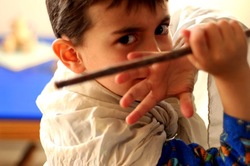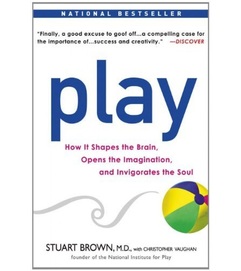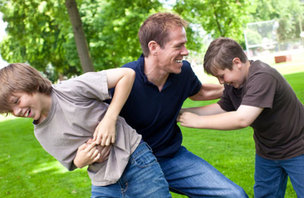 Kids need violent play. Although this statement may sound alarming (particularly form a child therapist) hear me out. Every day in my child therapy practice I hear children tell me how they weren’t allowed to pretend sword fight in school, or they can’t play superheroes, or they aren’t allowed to play tag because someone could get hurt. Although I understand teachers and parents are just trying to create peaceful environment, frankly these reports concern and upset me. I deeply want children to be able to feel safe emotionally and physically, to be kind to one another, to build healthy relationships, and to thrive in all areas … and the overwhelming evidence shows that if children are deprived of rough-and-tumble play these skills don’t develop properly.  Stuart Brown, MD is the founder of the National Institute of Play, researcher, and author. He has studied play and its effects for years. One of the most important findings he and his researchers have discovered is that when children are not allowed to engage in rough-and-tumble play (defined in his book as “play-fighting … and any activity that includes body contact among children…(including) superhero play” p.90), these children grew up to be antisocial and at times violent, including mass murderers (his first subject was the man who committed the Texas Tower Massacre). When the impulse to play was suppressed, these individuals were stripped of their natural method of learning such important social and emotional skills as empathy, boundaries, and self regulation.  In his pivotal and profound book, Play: How it Shapes Shapes the Brain, Opens the Imagination, and Invigorates the Soul Dr. Brown writes: “Research on rough-and-tumble play in animals and humans has shown that it is necessary for the development and maintenance of social awareness, cooperation, fairness, and altruism. Its nature and importance is generally unappreciated, particularly by preschool teachers or anxious parents, who often see normal rough-and-tumble play behavior such as hitting, diving, and wrestling (all done with a smile, between friends who stay friends) not as a state of play, but a state of anarchy that must be controlled.” (p.88) Parents and teachers are tasked with keeping children safe, and there is indeed risk in rough-house play. But what Dr. Brown discovered was that the benefits far outweighed the risk of scratches, hurt feelings, or even a broken bone here or there. He describes research on animal play that shows that when mammals are allowed natural play they are better able to socialize and make decisions, and those that are deprived of this play are stymied for life, unable to read social cues or deal with stress. We must help our children keep their bodies safe, but what of their spirit? We need to nourish that through this natural play as well. Empathy, the ability to set healthy boundaries, and to problem-solve stressful situations are developed when children are allowed lightly supervised rough-and-tumble play.  When a child runs after another child and pounces too hard, they get to see the effect that behavior had on their friend. The child cries, the pouncer feels bad and some part of him says, ‘I won’t do that again.’ This is how empathy is built. Brick by brick, pounce by pounce. And it’s also how boundaries are discovered and set. The child being pounced realizes what is too much and what is okay and learns how to communicate that. So the next time your child gets out his or her imaginary sword and cape, get yours out too, and let the tumbling begin. (Worried about how to set appropriate limits within rough play to keep it from crossing that line from healthy rough-housing into danger? Stay tuned for more on this next week…)
1 Comment
|
AuthorKaren Wolfe, MFT is a psychotherapist in San Francisco and the East Bay. She is passionate about helping children and families thrive and has particular expertise with children with exceptional learning and sensory styles. Archives
August 2016
Categories
All
|
|
2354 Post St, Suite B,
San Francisco, 94115 |
3655 Grand Avenue,
Oakland, CA 94610 |
Greenwood Court,
Orinda, CA 94563 |
